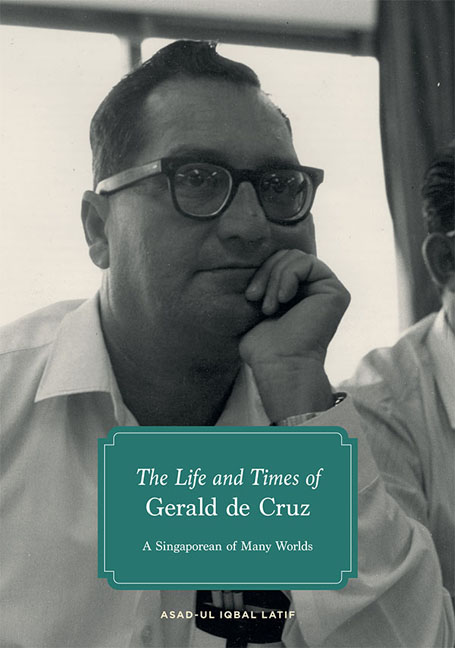Book contents
- Frontmatter
- Dedication
- Contents
- Preface
- Family Tree: Gerald Evelyn de Cruz
- 1 Don de Cruz de la Singapura
- 2 Childhood and Youth
- 3 The Japanese Occupation
- 4 The Communist Years
- 5 Going Abroad
- 6 The English Years
- 7 Return to Singapore
- 8 The Political Thinker
- 9 Friend of Labour
- 10 The Columnist
- 11 The Family Man
- Appendix
- Index
- About the Author
- Plate section
- Frontmatter
- Dedication
- Contents
- Preface
- Family Tree: Gerald Evelyn de Cruz
- 1 Don de Cruz de la Singapura
- 2 Childhood and Youth
- 3 The Japanese Occupation
- 4 The Communist Years
- 5 Going Abroad
- 6 The English Years
- 7 Return to Singapore
- 8 The Political Thinker
- 9 Friend of Labour
- 10 The Columnist
- 11 The Family Man
- Appendix
- Index
- About the Author
- Plate section
Summary
Gerald de Cruz remains a larger-than-life figure to his three children by two marriages, to Coral in 1949 and to Maimunah in 1970 after Coral had died in 1965.
His eldest child, Judith Prakash, was born in 1951. She remembers him as a loving and warm father who knew how to engage children, tell them stories, and hold them spellbound. He was very welcoming of her friends, treating them as equals and talking to them without condescension. “He always respected them and talked to them as if they would have something interesting to tell him. I was very close to him because he was very communicative. Yes, he had a temper but, on the whole, he made life fun”, the Singapore Supreme Court Judge says. He also had a sense of adventure. She remembers travelling with him down Siglap Hill in his Morris Minor, with the roof down and her standing up. Once, a bee got between his glasses and his eye, causing him to lose control and the car to tilt to one side dangerously. Luckily, no one was hurt.
She remembers her father's kind-heartedness, from giving people a lift in his car to bringing home waifs, like a boy who had got into trouble with the law whom he tried to reform. She remembers as well the close relationship that her parents enjoyed. “He was rather patriarchal when it came to being useless at house work, and he was more of the decision-maker than my mother was”, she recalls with a smile. “But there were no intellectual differences between my parents. My father believed that women and men were equal. He had no hierarchy in him, no sense of being better than anyone else. He was a democrat at heart.” It was this belief in the equality of humans that enabled him to believe that he could actually visit Stalin in Moscow and convince him of the need to change Soviet strategy in Southeast Asia. His personality was such that he attempted in all seriousness what others would have dismissed out of hand.
Judith was thirteen when her mother died, and her father became an overwhelming presence in her life. He encouraged her in debating at school, and convinced her of the intellectual and moral joys of studying Law at university.
- Type
- Chapter
- Information
- The Life and Times of Gerald de CruzA Singaporean of Many Worlds, pp. 194 - 202Publisher: ISEAS–Yusof Ishak InstitutePrint publication year: 2015

